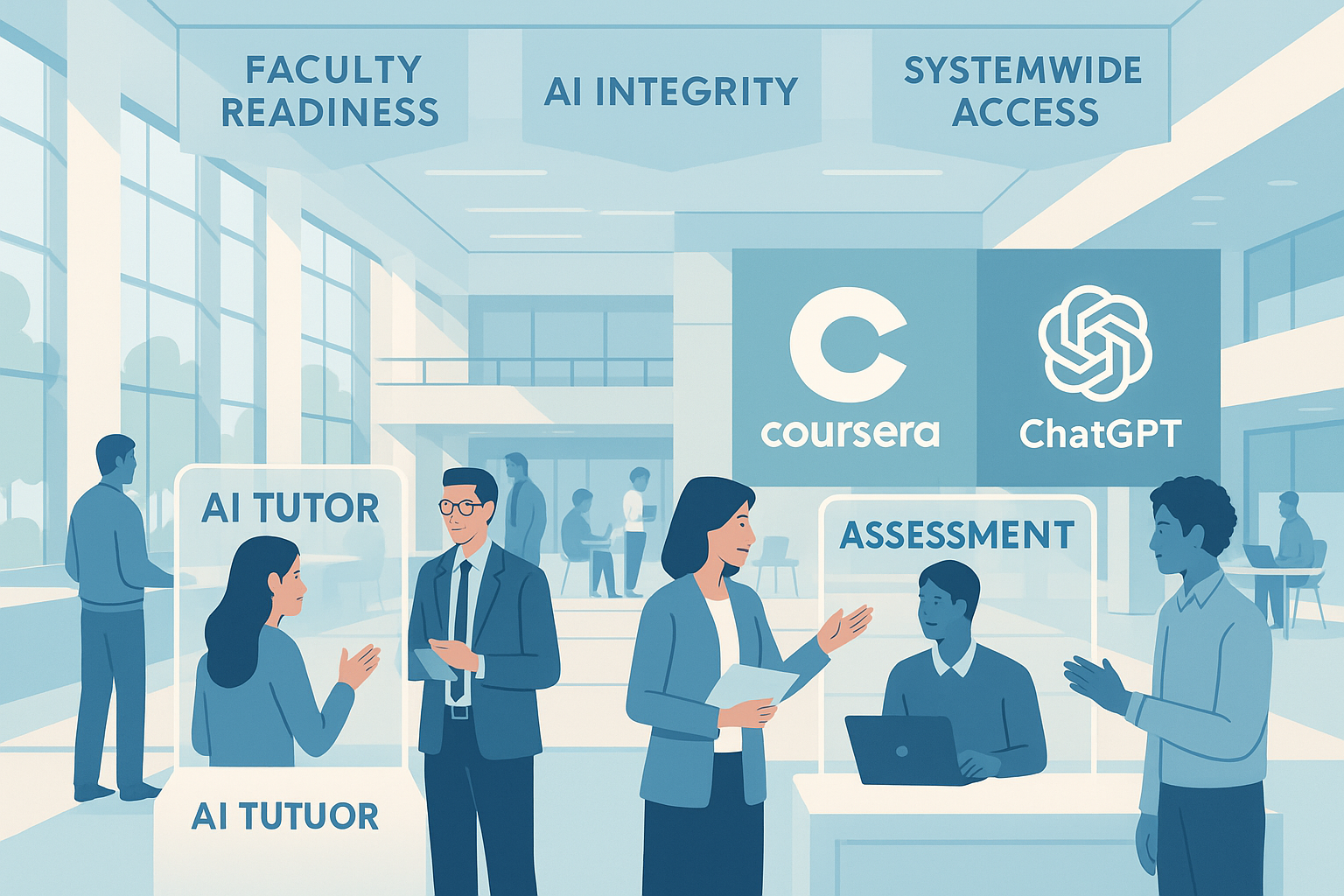

California Community Colleges launch system-wide AI learning assistants
Summary
California Community Colleges will deploy Nectir AI learning assistants across all 116 campuses, reaching about 2.1 million students. Pilot data reported gains in GPA, final scores, and motivation (Axios, 2025).
The Details
- AI tutors are embedded inside course shells and provide 24/7, course-aligned support.
- Pilot outcomes at Los Angeles Pacific included a 20% increase in GPA, 13% higher final scores, and a 36% boost in motivation.
- Faculty guide parameters and escalation rules to preserve grading integrity.
- System leadership is forming an AI Fellows network to share responsible-use models across disciplines.
- The rollout positions AI as a governed infrastructure similar to libraries or the LMS.
Why it Matters
This is the largest coordinated AI tutoring deployment in U.S. higher education. It will pressure campuses to align assessment, faculty workload, privacy, and oversight so that scaled tutoring improves learning without eroding trust.
Coursera brings accredited learning inside ChatGPT
Summary
Coursera launched an official app within ChatGPT, using OpenAI’s new Apps SDK, that lets learners explore and begin courses directly within the chat interface (Business Wire, 2025).
The Details
- Part of the first global wave of ChatGPT apps, alongside brands like Canva and Spotify.
- Learners can query “show me beginner data analytics” and launch accredited options without leaving ChatGPT.
- OpenAI’s SDK standardizes development and enables an app directory for discovery.
- Integration blends credentialed instruction with AI assistance, raising questions about identity, data sharing, and academic integrity.
- Campuses will need guidelines for external AI platforms that intersect with coursework and advising.
Why it Matters
Learning is moving into AI-native environments. Faculty must design for multi-platform study and integrity, or risk ceding pedagogy and visibility to commercial ecosystems.

Policy & Governance
-
EU AI Act consultation on “serious incident” reporting
Compliance moves from concept to checklist, with draft templates that will require reporting of high-risk AI incidents affecting rights and safety. If your campus relies on EU-linked vendors, start your incident playbook now (Hunton Andrews Kurth, 2025).
-
HEPI to DfE: publish the evidence behind AI policies
With student GenAI use reportedly at 93 percent, HEPI urges the Department for Education to “show your workings,” suggesting that assessment reform should be based on transparent data, not assumptions (HEPI, 2025).
-
UNESCO issues practice-oriented guidance for AI in education
Rights-based, usable guidance for ministries and universities, focused on safe deployment, capacity building, and accountability, a timely reference as campuses scale tools (UNESCO, 2025; UNESCO Right to Education, 2025).

Programs, Research & Infrastructure
-
-
Google’s AI Pro for Students free-year access winds down
As the trial window closes, institutions need a clear stance on renewal and equity, with clear guidance posted for students on eligibility, permitted use, and privacy (Google, 2025).
-
Jisc scales academic-integrity training for the GenAI era
Workshops shift staff from detection to design, offering authentic assessment models and ready-to-adapt templates that CTLs can deploy this term (Jisc, 2025).
-

Other
-
OpenAI turns ChatGPT into an app platform.
Third-party apps like Coursera and Canva are now integrated into ChatGPT, which means student study flows will reside within a general AI assistant, rather than solely in the LMS (The Verge, 2025).
-
Cambridge hosts the Generative AI in Education event, 27–29 October.
A focus on inclusion and measurable practices, combined with a timely venue, enables faculty to gather examples that tie pedagogy to outcomes (University of Cambridge, 2025).
-
UNESCO: what to know about AI and the right to education
A concise explainer that supports campus messaging on safe, lawful, and ethical use, helpful for policy pages and student guides (UNESCO, 2025).

Translate this Week’s developments into practical action, consider these immediate steps your campus teams can take
Do It Now Checklist
Betting on faculty-aligned platforms
This week marks a significant milestone as AI reaches critical mass across instruction, access, and governance. The decisive factor remains whether the faculty leads the implementation or follows it. Betting on faculty-aligned platforms means embedding readiness, reflection, and integrity into every decision about deployment. As AI becomes the infrastructure of learning, success will depend less on the speed of adoption and more on how well institutions align technology with human intent.
With Inspiration Moments, we share motivational nuggets to empower you to make meaningful choices for a more fulfilling future. This week, betting on faculty-aligned platforms means building confidence before capacity, equipping educators with the time, training, and trust to shape technology that truly serves learning.
Stay mindful, stay focused, and remember that every great change starts with a single step. So, keep thriving, understanding that “Life happens for you, not to you, to live your purpose.” Until next time.
Respectfully,
Lynn “Coach” Austin
References
All sources are hyperlinked in-text for immediate access to original publications.
🎧 Listen to the Podcast
Season 5: Episode 2 – AI in Higher Education: From Novelty to Necessity

